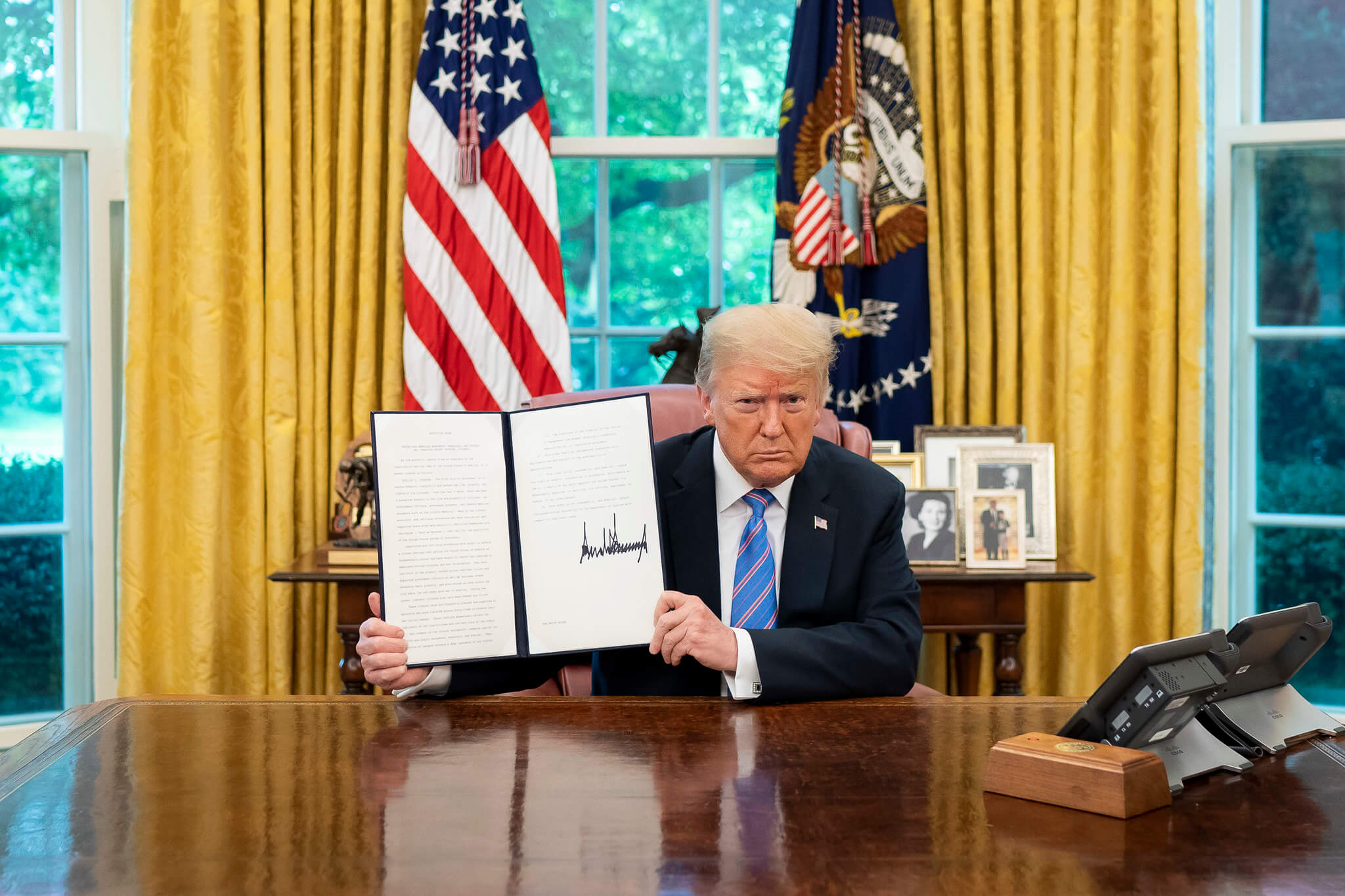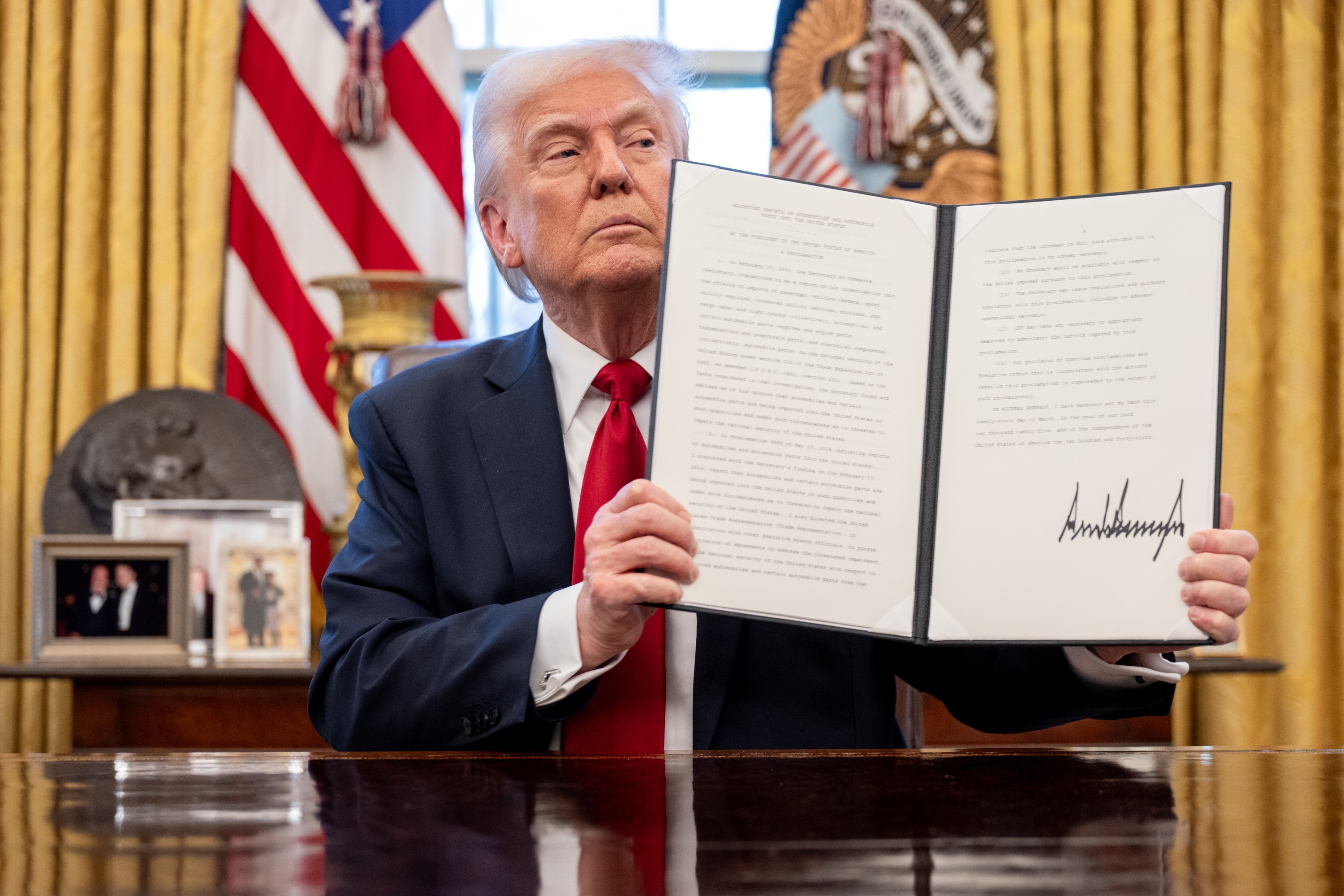The Trump Administration Pushes the Hatch Act to Its Limits
But whether those boundaries have been breached may not matter in the end.

Seemingly everyone in Washington has been fast to point fingers over the government shutdown—including public officials for whom some forms of finger-pointing are against the law.
“The Radical Left are going to shut down the government and inflict massive pain on the American people unless they get their $1.5 trillion wish list of demands,” a message on the website for the Department of Housing and Urban Development blared in 36-point font against a bright red background ahead of the lapse in appropriations. “The Trump administration wants to keep the government open for the American people.”
This is only one example of the profusion of pop-ups, headers, newsletters and out-of-office email replies blaming Democrats for the shutdown that watchdog groups and ethics experts warn may violate the Hatch Act, the Depression-era law that prevents federal employees from engaging in politics while on the job. In what former U.S. attorney Joyce White Vance pointed out as an irony of ironies, a possible Hatch Act violation appears on the very Department of Justice page advising workers that they’re subject to the Hatch Act.
Whether the Trump administration’s communications do contravene the letter of the law is less obvious than it looks at first glance. But they flagrantly challenge its spirit. The Office of Special Counsel (OSC), the independent agency responsible for Hatch Act enforcement, noted in a 2021 report that “the historical record shows that one of Congress’s motivations in passing the Hatch Act was to prevent the creation of a ‘powerful, invincible, and perhaps corrupt political machine … using the thousands or hundreds of thousands of federal employees, paid for at public expense, to man [a political party’s] political structure and political campaigns.’”
Taking together the banners emblazoned on .gov domains across the Internet and the automatic replies attached to federal employees’ email accounts, sometimes without their permission, it’s difficult not to see exactly such a machine in motion.
The “Radical Left Democrat” Shutdown
The Department of Housing and Urban Development is only one voice in a chorus of departmental outrage over the shutdown. The Department of Agriculture’s website, for example, sounds off, “Due to the Radical Left Democrat shutdown, this government website will not be updated during the funding lapse. President Trump has made it clear he wants to keep the government open and support those who feed, fuel and clothe the American people.”
Other agencies, such as the Centers for Disease Control and Prevention, the Food and Drug Administration and the Department of Health and Human Services have been (slightly) more muted. They declare that the “Trump Administration is working to reopen the government for the American people” and “mission-critical activities…will continue during the Democrat-led government shutdown.” The State Department announces, “Due to the Democrat-led shutdown, website updates will be limited until full operations resume”; the Justice Department says, “Democrats have shut down the government. Department of Justice websites are not currently regularly updated.”
The Department of Defense, Department of Homeland Security and Department of Education, mention merely a “lapse in funding” or appropriations. Intentionally or not, they’re proving—as previous administrations, including the president’s own eight years ago have already proved—that it is possible to inform citizens of the current state of affairs without throwing a partisan tantrum. Those bent on pitching fits, however, haven’t restricted themselves to website banners. They’ve also put their grievances into email blasts, both internal and external.
The White House Office of Management and Budget sent notes to staffers across the government claiming that the shutdown would be “forced by Congressional Democrats.” The Department of Veterans Affairs opted to more colorfully describe “radical liberals in Congress,” and its press secretary sent a statement to the media accusing said radical liberals of “trying to shut down the government to achieve their crazy fantasy of open borders, ‘transgender’ for everybody and men competing in women’s sports.” The department’s email newsletter designed for “Veterans, their families, caregivers, and survivors” was more restrained, but the message was the same—just directed at people who typically rely on those communications for services and benefits.
Finally, departments have asked their employees to join in on the blame game—transmitting templates for automatic out-of-office replies grousing about, yes, “Democrat Senators.” The Department of Education went one step further, taking it upon itself to adjust whatever auto-replies their employees had crafted. Furloughed workers were surprised to find “themselves” writing, “Unfortunately, Democrat Senators are blocking passage of H.R. 5317 in the Senate which has led to a lapse in appropriations.”
The Hatch Act
The Hatch Act restricts the political activity of “all federal civilian executive branch employees” except for the president and vice president” (5 U.S.C. § 7322).
One provision of the act (5 U.S.C. § 7323) addresses specifically the use of “official authority or influence for the purpose of interfering with or affecting the result of an election.” Another contains a prohibition on “participation in political activities while on duty,” with political activity defined as “an activity directed toward the success or failure of a political party, candidate for partisan political office, or partisan political group” (5 U.S.C. § 7324).
That certainly sounds as if railing against the opposition party for ruining the lives of innocent civilians on a taxpayer-funded website ought to land any responsible official (in most cases, the secretary of the department at hand) in trouble. But the Hatch Act, as typically interpreted, is riddled with holes through which the public-facing partisan opinions of a federal employee can slip.
Establishing a nexus to an election is easy enough when an official mentions a candidate other than the incumbent—or, worse, literally and explicitly encourages people to vote for his boss. Look at former Secretary of the Navy Carlos Del Toro, who in January of 2024 said in a Q&A after an official speech, “We cannot afford to have a president who aligns himself with autocratic dictators and rulers whose interpretation of democratic principles is suspicious [at] best…And so I’m confident that the American people will step up to the plate come November and support President for a second term as our commander-in-chief.” Or consider what the OSC determined were Hatch Act violations by members of President Trump’s administration surrounding the 2020 election: then-National Security Advisor Robert O’Brien asking, for instance, “Who do you want to turn to to rebuild the economy—the guy who’s proven he can do it, President Trump, or somebody who’s been in Washington for 40 years?”
But it’s harder when a federal employee mentions not a candidate but a party, and harder still when the immediate context doesn’t involve an election. During the Biden administration, Secretary of Education Miguel Cardona sent an email to federal student loan borrowers explaining that lawsuits by “Republican elected officials” could affect their programs. The OSC declined to impose a penalty under the Hatch Act, because he didn’t “refer to candidates, elections or voting”—and because he was discussing a policy topic. What’s more, Cardona was sticking to the facts, or transmitting accurate information: All 18 plaintiffs in the relevant judicial proceedings were “represented by Republican elected officials or, in one case, an appointee of a Republican elected official.”
The Consequences (Or Not)
What does this mean for today’s debate? That depends in part on the communique in question: Referring to the “Radical Left” might seem as politically charged as it gets, and yet for the purposes of the Hatch Act, it may actually be less risky than referring to the “Democratic Party.” One housing department official made precisely that case when he told reporters the department’s message was “deliberately worded to avoid violating the law” by referring to what he characterized as not a political party, but an ideology.
There are plenty of other ways to wriggle out of legal danger. Officials can argue that when they do refer to the Democratic Party by name, they’re doing so in its institutional capacity as the congressional minority instead of its electoral one. They can maintain that the shutdown dispute is about policy, not politics—and therefore not about the Democratic Party’s “success or failure” at all. Officials can also contend that they, like Cardona, are sticking to the facts: All but one of the senators to vote against the spending packages were Democrats. The only exception was Sen. Rand Paul (R-Ky.).
These arguments can be plausibly rebutted: For one thing, as transmitting accurate information goes, who truly deserves blame for the funding imbroglio is subjective. The “aye”s and “no”s don’t tell the whole story, and pinning culpability on Democratic senators is less a matter of facts than of framing. Along the same lines, this is a political contest between two parties; the prize is as much the better opinion of the American people as it is any particular budget line item.
The all-purpose, all-of-government campaign the White House has coordinated against those “Democrat Senators”—language reeking, much like “Radical Left,” of partisanship—makes clear that the messages, almost every one a variation on every other, are part of a broad-based political clash. Policy substance, meanwhile, is conspicuously lacking from the messages. There is no public health purpose served by, say, the Centers for Disease Control calling out the Democrats without explaining the shutdown’s effect—or not—on particular programs or protections. Contrast that with Cardona’s email, in which he was helping student borrowers understand the impact specific judicial decisions would have on a benefit his department was providing to them.
Similar logic underlies complaints by watchdog groups alleging violations not just under the Hatch Act, but also under laws such as the Anti-Deficiency Act (31 U.S.C. § 1341) and Anti-Lobbying Act (18 U.S.C. § 1913). The former forbids using appropriated funds for unauthorized purposes, including—an annual appropriations rider has historically provided—“publicity and propaganda.” The latter bars federal agencies from using appropriated funds to influence members of Congress, but the Justice Department has typically construed the act narrowly. This Justice Department, given its general attitude toward accountability for the administration and its allies, and the hollowing out of the units traditionally tasked with investigating these allegations, can reasonably be expected to construe it more narrowly still.
Department of Education employees in particular may be able to find more recourse. The American Federation of Government Employees has sued the department for manipulating workers’ out-of-office email replies, arguing that the messages—written in the first person—violate the First Amendment’s prohibition on the government compelling speech. “Employees,” the complaint states, “are now forced to involuntarily parrot the Trump Administration’s talking points with emails sent out in their names.”
The Machine
Shutdown-related messaging by Trump's Cabinet at the very least pushes the Hatch Act’s limits, hard. But whether those boundaries have been breached may not matter in the end. The Hatch Act enforcement regime counts on the executive branch to be disciplined as well as to discipline. President Trump’s administration seems disinclined to do either.
The previous head of the Office of Special Counsel, Hampton Dellinger, would probably have taken the alleged violations seriously. After all, he took seriously the mass removal of probationary employees without proper procedure last winter, when it determined the administration’s actions likely violated the law. Yet Trump terminated Dellinger soon after that opinion was issued, explicitly breaching a statute that specifies the special counsel can be dismissed only for "inefficiency, neglect of duty or malfeasance in office”—and inviting a separation of powers dispute that the president, for now, has won.
U.S. Trade Representative Jamieson Greer is currently acting OSC head; the 30-year-old former podcast host and Substacker Paul Ingrassia was nominated for the position, but his confirmation hearing was postponed this summer following criticism over his associations with neo-Nazis and descriptions of federal workers as “bugmen” who “leech the diminishing lifeblood of the dying republic.”
With the relevant authorities either neutered or uninterested in fulfilling their constitutional obligations, the Trump administration is testing its ability to pull undisturbed on the levers of government to advance its agenda. Next time, when this government tells the people who rely on it for essential services—or for employment—who the enemy is, officials may be less careful, and more convincing, with their words. It’s unlikely anyone will stop them then, either. That’s how the machine Congress worried about almost a century ago gets built.





